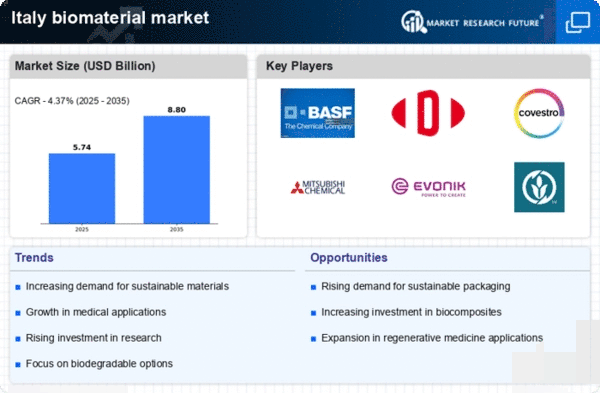Rising Demand for Eco-Friendly Products
The increasing consumer awareness regarding environmental sustainability is driving the demand for eco-friendly products in the biomaterial market. In Italy, consumers are progressively opting for products that minimize ecological footprints, which has led to a surge in the adoption of biomaterials. This shift is reflected in market data, indicating that the biomaterial market is projected to grow at a CAGR of approximately 12% from 2025 to 2030. As companies respond to this demand, they are investing in research and development to create innovative biomaterials that align with consumer preferences, thereby enhancing their market presence.
Technological Advancements in Biomaterials
Technological innovations play a crucial role in the evolution of the biomaterial market. In Italy, advancements in material science and engineering are enabling the development of new biomaterials with enhanced properties, such as improved biocompatibility and biodegradability. These innovations are not only expanding the application range of biomaterials but also increasing their performance in various sectors, including healthcare and packaging. The market is witnessing a notable increase in investments, with estimates suggesting that the biomaterial market could reach €1 billion by 2027, driven by these technological breakthroughs.
Growing Investment in Research and Development
Investment in research and development is a pivotal driver for the biomaterial market in Italy. Companies are recognizing the importance of innovation in maintaining competitiveness and are allocating substantial resources towards R&D initiatives. This trend is evident in the increasing number of collaborations between academic institutions and industry players, aimed at developing cutting-edge biomaterials. The biomaterial market is expected to benefit from these investments, with projections indicating a potential market size increase to €800 million by 2028, as new products and applications emerge from ongoing research efforts.
Government Initiatives for Sustainable Practices
Government initiatives aimed at promoting sustainable practices are significantly influencing the biomaterial market in Italy. Policies encouraging the use of renewable resources and the reduction of plastic waste are fostering an environment conducive to the growth of biomaterials. For instance, the Italian government has implemented regulations that incentivize companies to adopt sustainable materials, which is likely to enhance the competitive landscape of the biomaterial market. As a result, businesses are increasingly aligning their strategies with these regulations, potentially leading to a market expansion of around 15% over the next five years.
Consumer Preference for Health-Conscious Materials
The shift in consumer preferences towards health-conscious materials is reshaping the biomaterial market in Italy. As individuals become more health-aware, there is a growing inclination towards products made from natural and non-toxic materials. This trend is particularly pronounced in sectors such as food packaging and medical devices, where safety and health are paramount. Market analysis suggests that the biomaterial market could experience a growth rate of approximately 10% annually, driven by this consumer demand for safer, healthier alternatives. Companies are thus compelled to innovate and adapt their offerings to meet these evolving consumer expectations.
















